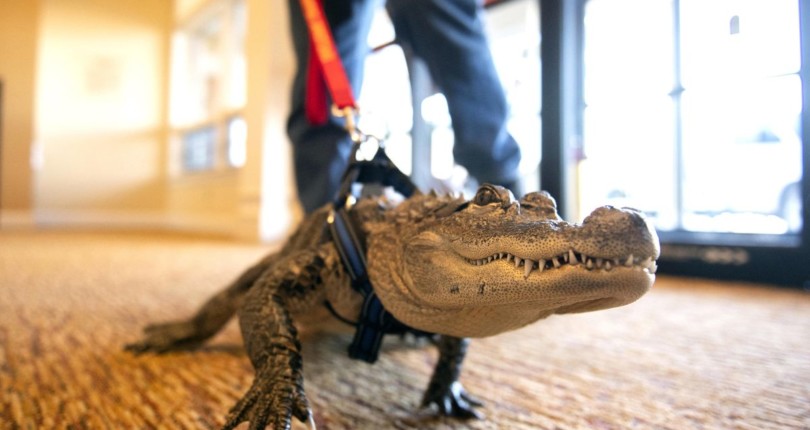What is the difference between a service and a support animal? Can a homeowner keep an alligator as an emotional support animal? What is the legality of having an animal in a community with by-laws that prevent pets? What can an Association ask for or request? Until recently, there was a lot of gray areas when it came to allowing a resident to have an Emotional Support Animal. With HUD’s latest guidelines released in January of 2020, some of that gray area has been clarified.
Vlog Video:
Podcast Audio Only:
Service Animal vs Emotional Support Animal
A Service Animal is trained to assist a person with a physical, sensory, psychiatric, intellectual or other disability. It represents a huge investment of time and money in training. Some commonly trained tasks include:
- Providing guidance to people who are blind or nearly blind
- Enable a proper response to auditory stimuli for people who are deaf or nearly so
- Providing physical support to people with physical limitations, like those with low muscle tone or those in a wheelchair
- Promoting a proper response to physical stimuli and interfering with repetitive or self-harming behavior for those on the Autism Spectrum
- Recognizing the symptoms of a seizure and protecting their companions when one occurs
The New guidelines state:
- Service Animals can only be dogs.
- If the disability is not readily apparent, Associations can ask two (2) questions:
- “Is the animal required because of a disability?”
- “What work or task has the animal been trained to perform?”
- You may not ask about the specific treatment of the disability (that would fall under HIPAA privacy laws).
- You cannot ask for documentation on the disability.
- These animals are not considered pets and not subject to:
- By-laws restricting animals in any way.
- Any pet fees or fines.
If the answer to the questions above is no, then the animal does not qualify as a Service Animal, but it still may meet the qualifications of an Emotional Support Animal.

Emotional Support Animals fall into a large spectrum of assistance-related animals. Emotional Support Animals do not receive nearly the amount of training as service animals, some getting none at all. What exactly is an Emotional Support Animal? It’s a companion animal that eases, among some things:
- Anxiety
- Depression
- Some phobias
- PTSD
- Loneliness
In the case of an Emotional Support Animal HUD provided an outline in the latest guidelines:
- The Association should establish whether the person has an observable disability or is the Association aware of information giving them reason to believe the person has a disability. If so, then has the person requesting the accommodation provided information that the animal does work, performs tasks, or provides therapeutic emotional support. If the individual has not provided this information, the request may not be denied until the individual is given a reasonable amount of time to provide this information.
- The new HUD Guidelines also provide information as to the information to determine the disability, which may include receipt of disability benefits or services, Medicare or Supplemental Security Income, veteran’s disability. Please refer to the HUD Guidelines for a complete list.
- The documentation provided must be provided by a licensed health care professional, such as a physician, optometrist, psychiatrist, physician’s assistant, nurse practitioner, or nurse.
- The documentation must be general to the condition but specific to the individual. In addition, the documentation must also document a relationship or connection between the disability and the need for the assistance animal.
- The HUD Guidelines also address Documentation from the Internet. Please refer to the HUD Guidelines and/or the Association’s attorney as to the specifics of these requirements.
According to the Fair Housing Act, a reasonable accommodation is “a change, exception, or adjustment to a rule, policy, practice, or service that may be necessary for a person with a disability to have equal opportunity to use and enjoy a dwelling, including public and common use spaces.” In other words, the individual is requesting to keep an animal when an Association has a no pet policy. This request does not have to be in writing and the individual does not have to say he is requesting a reasonable accommodation. An Association has to be very careful not to restrict the manner in which a request must be made.
Why Would An Emotional Support Animal Be Denied?
Service Animals are rarely denied because their need and training is often readily apparent, but under what conditions can you refuse an Emotional Support Animal?
- The animal poses a direct threat to the health or safety of others that cannot be reduced or eliminated by another reasonable accommodation.
- The animal in question would cause substantive physical damage to the property that cannot be reduced or eliminated by another reasonable accommodation.
- The animal may be denied if the owner or companion fails to produce the required paperwork from the physician or mental health professional treating them.
What About Those Exotic Animals?
While stories about people having emotional support alligators or beehives may seem comical, bringing those types of animals into a structured association may happen. Fortunately, HUD’s new guidelines now defines what an Emotional Support Animal as ‘unique’’ in nature, when it is not normally kept in a home for pleasure purposes. Here is where that alligator might just get through the system, but when submitting a request for reasonable accommodation ‘the requestor has the substantial burden of demonstrating a disability-related therapeutic need for the specific animal or the specific type of animal.’
As an example of a unique animal and some of the tasks they perform, I recently learned that some monkeys are specially trained to help a person that suffered from arthritis open their medication bottles, take out the pills, and provide the pill to the individual. One would never think that a monkey could be an Emotional Support Animal, but this is a perfect example of a situation where they qualify as an ESA.
Timeframe
While it may be frustrating, as a board member, to suddenly ‘discover’ an animal in a community with strict pet policies, the new guideline does not establish a timeframe under which a resident must request a reasonable accommodation. This means that they may request the accommodation at any time.
For more on Service and Emotional Support Animals, listen to our recent conversation between Sal Jurado from Jurado and Associates and our own Ana Rivero. You can also click here to view HUD’s new Guidelines.
(photo Ty Lohr / York Daily Record via AP)




